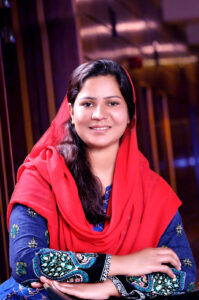Posted to Sister Zeph’s Journal
By Sister Zeph
On 24 October, 2013
By Zephaniah
Ghazalla, a woman of around 40 years, was born into a peaceful and respectable family. She received an education up to the 8th standard and excelled in the art of crochet, creating intricate and beautiful pieces with her skills.
However, Ghazalla’s educational journey was cut short due to the absence of a high school near her village. When she crossed the age of 20, her parents, eager to find a suitable match for her, embarked on the quest to find a well-established groom. Her elder sister had married an educated man, and her parents sought a similar future for Ghazalla.
Their efforts were relentless, seeking support from numerous people, but they struggled to find the right match. Many families came to consider her for their sons, yet every time, she faced rejection. This experience left her feeling humiliated and insulted. She no longer wished to marry, but societal tradition compelled her to continue presenting herself to prospective suitors, hoping that one day she would be accepted.
Eventually, her father ventured to a distant village where he found a groom, a 30-year-old man who had remained unmarried due to his lack of physical attractiveness. He had neither a home nor a job and relied on Ghazalla’s mother and sisters, who worked as dishwashers in a bungalow, to sustain him. Ghazalla’s father, exhausted by the search, gave his consent to the marriage.
Upon her arrival at her husband’s side after the wedding, Ghazalla was confronted with a stark reality. She felt as though she had married a person completely devoid of charm, and on their wedding night, he was inebriated and bit her cheek, leaving a visible scar that still lingers today. However, the most profound scars were those etched into her heart, hidden from the world’s view.
The following day, when she returned to her family home, her mother examined her face and uttered with a heavy heart that they had tried their best to secure a good match for her but couldn’t find one because she wasn’t as beautiful as her sister. She concluded that Ghazalla didn’t deserve an educated and decent husband. Her mother’s words cut deep, and Ghazalla felt as though her spirit had withered.
She longed to escape, to cry out, to question the world about her perceived fault, but she believed that everyone was blind, deaf, and mute to her anguish. Thus, she made the agonizing decision to endure her circumstances.
Today, Ghazalla has four children and works as a dishwasher in two bungalows. Through her relentless efforts, she built a mud house that tragically collapsed during the rainy season, leaving her homeless once more. Her sons have followed in their father’s footsteps, remaining uneducated, while her elder daughter is learning stitching and hair cutting in a learning center. Her younger daughter is enrolled in school, and Ghazalla fervently wishes for her children to attain higher education and skills, enabling them to take control of their lives.
Ghazalla describes her life as a living hell, devoid of hope and contentment, a relentless struggle for sustenance that will persist until her last breath. Her plight is emblematic of the hardships faced by many women in our world. The fundamental question arises: Why must women bear the burden of appearing physically attractive? Why should their happiness and success hinge on attracting a man for a secure future? Why do we prioritize physical appearance over mutual understanding, respect, and love in a marriage?
Why do we condemn innocent people to lives of misery simply because they do not conform to societal standards of physical beauty? How can it be acceptable that a girl’s worth is determined by her physical appearance, denying her love, contentment, comfort, and respect in life? It is a cruel and unjust reality that we must confront as a society.

